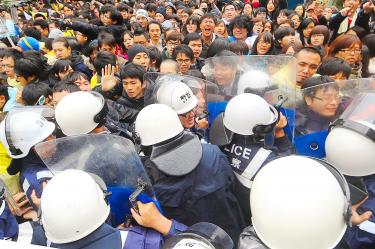Students, academics, civic group representatives and opponents of the planned sale of Next Media Group’s (壹傳媒集團) four Taiwanese outlets to a consortium yesterday vowed to keep fighting for the nation’s freedom of speech and media diversity as the controversial deal was set to be inked in Macau.
About 100 university students from the Youth Alliance Against Media Monsters ended their overnight protest in front of the Executive Yuan in Taipei shortly after noon after clashing with police twice as the students tried to enter the building.
Facing a large police force, the students, who had camped in front of the Executive Yuan since Monday afternoon, failed to enter the building or to make Premier Sean Chen or Vice Premier Jiang Yi-huah (江宜樺) meet them at the gate to discuss the deal.
The NT$17.5 billion (US$600 million) buyout plan for the Apple Daily, the Sharp Daily, Next Magazine and Next TV was to be signed by a consortium comprised of Want Want China Times Group (旺旺中時集團) chairman Tsai Eng-meng (蔡衍明), Chinatrust Charity Foundation (中信慈善基金會) chairman Jeffery Koo Jr (辜仲諒), Formosa Plastics Group (台塑集團) chairman William Wong (王文淵) and an unidentified investor yesterday afternoon in Macau.
The deal has sparked controversy because of the buyers’ large investments and business ties in China, causing fears that the buyout would increase Chinese influence over Taiwan’s media. In addition, Tsai, who already owns several media outlets, has a reputation for interfering in editorial policy.
Confrontations between the students and police began when demonstrators tried to climb the fence and enter the Executive Yuan.
A student was sent to hospital after having problems breathing and another was briefly arrested, before being released on the spot.
At 12:30pm, student alliance leader Lin Fei-fan (林飛帆) announced that the students would retreat from the Executive Yuan, but that more protests were planned, as the deal still needs to be reviewed by several government agencies before being finalized.
Lin said the students would protest at the Fair Trade Commission tomorrow when the commission holds a public hearing on the deal.
“This is just the first engagement of the war of Next Media. We’ll be back,” said Chen Wei-ting (陳為廷), another student leader.
The demonstrators asked the government to pledge to strictly review the deal, pass an anti-media-monopoly act and prevent Chinese influence of Taiwan’s media. They also voiced support for the maintenance of Next Media Group employees’ journalistic autonomy.
Former Democratic Progressive Party (DPP) chairperson Tsai Ing-wen (蔡英文) gave her support to the students in a press release.
“The government is obligated to make sure that money cannot buy everything in this country, because freedom of speech is the soul of any democratic country and the media is the most important defensive line safeguarding this," she said.
Over the past few years, Taiwanese have seen how a media monopoly jeopardizes democracy and freedom of speech, Tsai added.
“If the government fails to protect the erosion of these values, the people will bond together and correct that mistake because, though Taiwan may be a country that thrives on trade, not everything in this nation is for sale,” she said.
DPP Chairman Su Tseng-chang (蘇貞昌) and several DPP lawmakers, including Chen Chi-mai (陳其邁), Hsiao Bi-khim (蕭美琴), Lee Ying-yuan (李應元), Yu Mei-nu (尤美女) and Taiwan Solidarity Union Legislator Lin Shih-chia (林世嘉), showed up at various protest sites to express their support of the movement.
Former premier Frank Hsieh (謝長廷) praised the students’ courage and commitment to public policies in a press release, saying that they represent the “consciousness and hope of Taiwan’s society.”
Meanwhile, the Executive Yuan reiterated in a press statement that it would not take a position on or get involved in the case, saying the Financial Supervisory Commission, the Fair Trade Commission and the National Communications Commission are the authorities tasked with reviewing the deal and since they are all independent agencies, they would exercise their powers accordingly.
The Executive Yuan said it would not give any instructions to the agencies.
“Freedom of speech is the foundation of a modern democracy. The Executive Yuan upholds freedom of speech as protected by the Constitution. Taiwan is a democracy ruled by law. With regard to media mergers and acquisitions, the government agencies assigned to them will review the cases in accordance with law,” the statement said.
It would be “inappropriate” for the Executive Yuan to weigh in on discussions about specific cases or to participate in the reviews handled by the independent agencies because the buyers involved have certain political inclinations, it said.
The Executive Yuan said it fully understood the demands made by the students since they gathered on Monday in the sit-in.
“Since 2pm [on Monday], representatives from the Financial Supervisory Commission, Fair Trade Commission and the National Communications Commission have been on standby in the Executive Yuan waiting to meet the petitioners. The Executive Yuan sent its staff to ask the petitioners if they would like to come in to talk or give us their petition letter every half-an-hour since 2pm, on four occasions, but students rejected the idea,” it said.
In an interview with reporters later yesterday, Executive Yuan spokesperson Cheng Li-wun (鄭麗文) said the Executive Yuan’s interference in the case would amount to “a step backward for democracy” since “the era of martial law in Taiwan ended many years ago.”
Source: Taipei Times - 2012/11/28





















